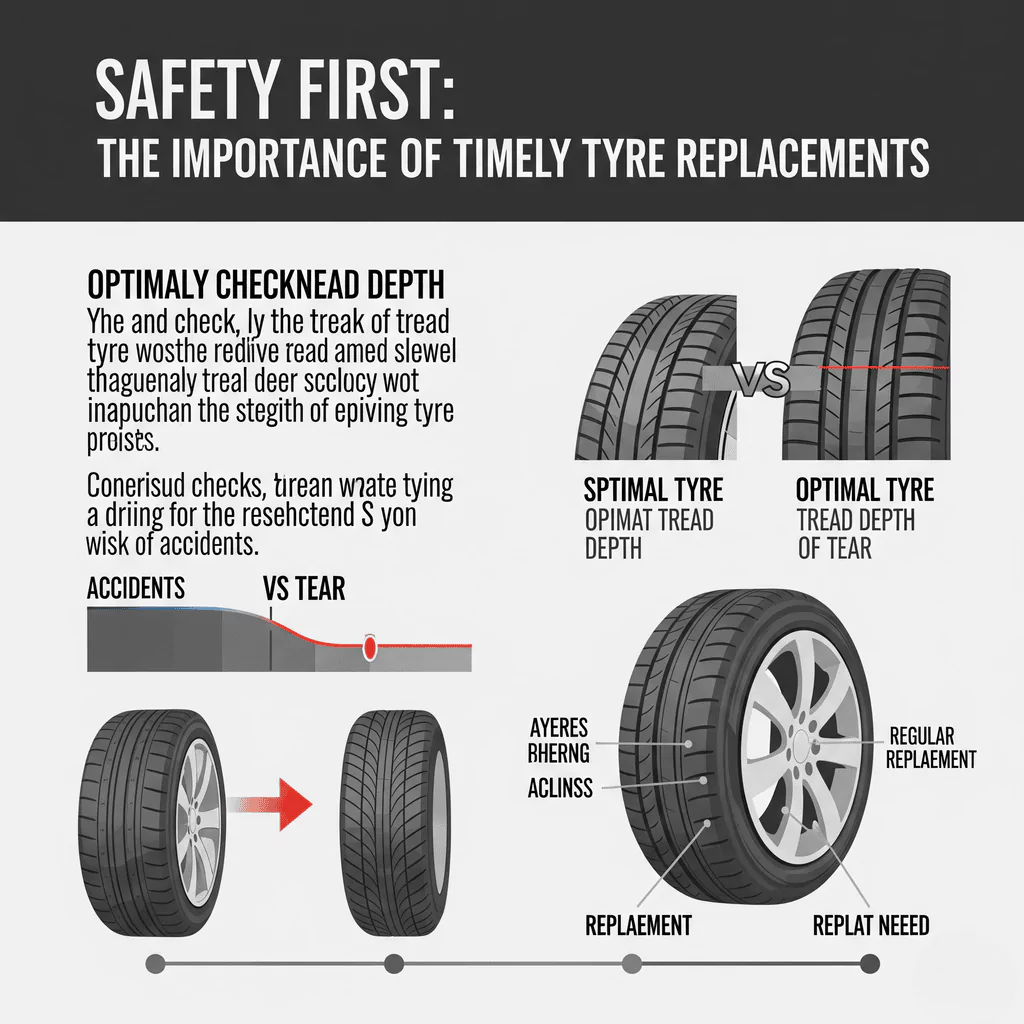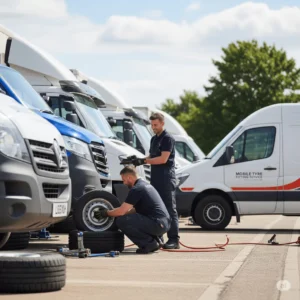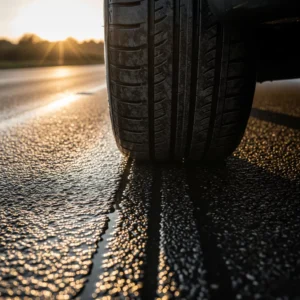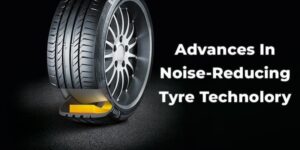When you’re driving on a rainy UK highway, have you ever felt your car slip a little on a turn? You’re not by yourself. Many drivers in the UK put themselves and others at risk by not taking care of their tires, which is one of the most important safety features on a car.
Because British weather is hard to predict, it rains a lot, and country roads are often slippery, tyre health is very important for road safety. Damaged or worn-out tires can make the vehicle less stable, make it take longer to stop, and even cause dangerous blowouts at high speeds.
This piece will talk about why replacing tires on time isn’t just a good idea—it’s necessary. You’ll learn about the secret dangers of worn tires using examples from UK roads. Also, you’ll find out how new technologies like mobile tire fitting 24 hours a day are making it easier than ever to stay safe. You’ll also get useful tips from experts that will help you spot warning signs and take action before it’s too late.
Why Tyres Are More Than Just Rubber on the Road
People don’t think much about their tires, but they’re the only part of your car that touches the road. You can tell how well your car stops, how well it grips the road, and even how much gas it uses by that small strip of rubber. To put it simply, tires are essential to the safety and performance of your car.
Tyres lose their ability to grip the road when they are worn down, cracked, or old. This can make it harder to stop, especially on roads that are wet or icy, and increase the chance of skidding or hydroplaning. It can also make it harder to control the car when turning corners. The engine has to work harder to make up for the worn-out tires, which also hurts fuel economy.
In the UK, a lot of crashes happen because of problems with tires. The Department for Transport says that in the past few years, bad tires have been linked to over 400 road deaths each year. That’s not just a number; it’s hundreds of accidents that could have been avoided because of something as simple as not checking the tires.
Take the case of James, who is a Bristol traveler. One night, as he was driving home as usual in the rain, his car suddenly skidded as it got close to a roundabout. Even though he stopped early, his car went into the middle island. Thank goodness no one was badly hurt, but the emergency services quickly figured out what happened: his front tires had a lot less tread than the law allowed. James had been putting off getting a new one for weeks because he thought he would “get around to it soon.” That wait could have cost him a lot more than just the price for the repair.
Tires aren’t just necessary for the car; they’re also a safety measure on UK roads. Ignoring their situation is not only dangerous, it could even be life-threatening.
How to Know When It’s Time for a Tyre Replacement
Key Signs Your Tyres Are Past Their Prime
Not only will knowing when to replace your tires keep you from getting fined, but it will also keep you safe on the road. Tires don’t have a set end date, but there are a few clear signs that they’re no longer good for use.
The tread level is the most important sign. The legal minimum in the UK is 1.6 mm across the middle three quarters of the tyre. Anything less than that could get you a fine and penalty points, and it makes it very hard to hold on, especially when it’s wet. A lot of experts say that tires should be replaced when they get to 3 mm of wear.
Watch out for cracks, bulges, or deep cuts that you can see in the walls. In the long run, these can turn into dangerous blowouts because of age, bad weather, or damage from potholes. If there are uneven wear patterns, like more wear on one side, it could mean that the balance or suspension is off, which could make the car hard to control.
You should also be careful if you feel vibrations in the steering wheel or if the car doesn’t handle as well as it usually does. This could be a sign of damage or an unbalance inside the tire. Lastly, always check for things like nails, screws, or pieces of glass that are stuck inside, especially if you notice that the pressure is slowly dropping.
If you notice these signs early and do something about them, you can avoid a breakdown on the side of the road or, even worse, a major accident.
How Often Should Tyres Be Replaced in the UK?
Different cars need different amounts of tread, but for UK drivers, a good rule of thumb is to get new tires every 20,000 to 30,000 miles or at least every 5 to 6 years, whichever comes first. The rubber in your tires breaks down over time, making them less safe and effective, even if they look fine on the outside.
tyres last longer in the UK when the weather is nice. Changing between wet, cold, and sometimes icy conditions all the time can make your tires wear out faster, especially if they aren’t made for the season. For example, summer tires that are used all year can get hard and lose their grip when it’s cold in the morning.
That’s why it’s important to check your tires every so often, especially as winter comes. For better grip and stopping power in the winter, you might want to think about getting winter or all-season tires. Even if you stick with normal tires, checking the tread depth, pressure, and condition when the seasons change can greatly lower your chances of breaking down or getting into an accident.
Your tires will always be ready to handle the unpredictable British roads, rain or shine, if you keep up with regular checks and replacements.
Risks of Delaying Tyre Replacement
Putting off replacing your tires might not seem like a big deal—they “look fine,” right? But waiting too long can quickly lead to major safety risks and expensive legal trouble. Old tires are a real danger that drivers in the UK can’t ignore because the roads and weather aren’t always reliable.
Safety Risks
One of the most dangerous things about worn-out tires is that they can blow out, especially on the highway at high speeds. A quick flat tyre can make your car veer out of control, putting you, your passengers, and other people in the road in great danger.
Also, worn tires make it much harder to stop, especially when it’s wet, icy, or cold outside. Just a few extra meters on a wet road could mean the difference between a safe stop and a major accident. When a tyre has little tread, it has a hard time moving water away from the surface. This makes the tyre aquaplane, which means the car skims across the water instead of holding the road. Right then, you lose control, and your driving isn’t very useful.
In the end? Not replacing your tires on time will not only make your drive less comfortable, it could even be dangerous.
Legal and Financial Consequences
Not only is it dangerous to drive in the UK with flat or broken tires, it’s also against the law. If you drive with tread depths less than 1.6 mm, you could get a fine of up to £2,500 and three penalty points per tyre. That means that if all four tires are worn below the legal limit, you could get a huge £10,000 fine and 12 points on your license, which is enough to make you unable to drive at all.
There are also effects on insurance. If you get into an accident and it turns out that your tires were illegal or in bad shape, your insurance company may not pay out because they will say that your car wasn’t safe to drive. In the worst situations, this could make you responsible for damage, injuries, or even deaths.
Putting off getting new tires doesn’t save you money; it can cost you a lot more than the price of new tires. You’ll get fined, your MOT will fail, your insurance claims will be thrown out, and an accident will cost so much that it’s not worth it.
It’s not only smart to take care of your tires, it’s necessary.
Mobile Tyre Fitting: The Game-Changer for Busy UK Drivers
The world moves quickly these days, and not everyone wants to or has the time to wait in a shop for a new tyre. That’s where smart tyre fitting comes in and completely changes the game. This modern answer brings professional tyre services right to your door, whether you’re stuck on the side of the road, at work or just relaxing at home.
What is Mobile Tyre Fitting and How Does It Work?
With mobile tire fitting, trained professionals come to your home, office, or the side of the road to replace or fix your tires. It’s a hassle-free service. It’s like having a shop on wheels.
How it works:
Booking
You visit the Rapid Mobile tyres website or call their hotline. Many services offer same-day or emergency slots.
Tyre Selection
You choose the right tyres for your vehicle—based on brand, size, and budget.
Scheduling
Choose a time and place that works for you. Some services even give you an hour to get there.
Fitting
A van with all the necessary tools shows up at your spot. The mechanic takes off the old tires, puts on the new ones, levels the wheels, and checks the pressure—all without you having to do anything.
Drive Away Safely
Within 30–60 minutes, you’re ready to hit the road with safe, fresh tyres.
Benefits of Using Mobile Tyre Replacement Services
The best thing about mobile tyre fitting is that it’s easy. You don’t have to change your plans, miss work, or look for a way to get to the garage. The service comes to you, no matter where you are.
Then there’s the factor of emergency reaction. People who have been stuck on a country road with a flat tyre and no spare know how stressful it is. Roadside tyre change services can save your life, especially if they are available 24 hours a day, seven days a week.
Rapid mobile tyre fitting can often get the job done faster than a regular shop, which saves you time. Some businesses say that the whole process takes less than an hour, from booking to finishing.
One more big plus is that it’s available. There are now dozens of reliable service providers all over the UK, especially in major places like Bristol, London, Manchester, and more. They are ready to help at any time. There are services like Same Day Mobile Tyre Fitting Bristol and Mobile Tyre Fitting UK that are known for being on time, professional, and dependable.
Mobile tyre fitting is more than just a convenience for UK drivers who have to balance work, family and everything else. It’s a modern necessity that makes tyre trouble a small inconvenience.
How to Choose the Right Tyre Replacement Service in the UK
There are now a lot of mobile tyre fitting services in the UK, which can make it hard to pick the right one. You don’t want to put your safety and your car in the hands of a service that cares more about speed than quality. Here’s how to pick a tyre replacement service that you can trust, that’s skilled, and that’s worth the money.
What to Look for in a Mobile Tyre Fitter
First, get your licence and insurance. Mobile tyre fitters with a good reputation should be fully trained and insured. Check to see if they are a part of reputable groups like the British Tyre Manufacturers’ Association (BTMA) or NTDA (National Tyre Distributors Association) if they are a technician.
Next, read reviews and customer scores on the Internet. Services that people trust will have a strong presence on sites like Google, Trustpilot, and Yell. Read what people say about how on time they are, how helpful they are, and how long they stay in touch afterward as well.
Also, experience is important. You can feel safer calling a company like Same Day Mobile Tyre Fitting Bristol or Mobile Tyre Fitting UK that has been in business for a long time and has dealt with thousands of calls. They know how to handle all kinds of tyre emergencies and car types.
Questions to Ask Before Booking
Before you make a promise, always ask these important questions to avoid being surprised:
- Do your techs have licenses and insurance?
- Do your prices include coming to your house to fix the tires, balancing them, and getting rid of the old ones?
- When do you think they’ll arrive?
- Do you sell many different brands and sizes of tires?
- Will the work and tires be fixed or replaced if something goes wrong?
These questions will help you find problems with the service and make sure it will do what it says it will do.
Avoiding Cheap, Unsafe Tyre Replacements
When money is tight, it’s tempting to go with the cheapest quote, but be wary of services that offer tires that seem too good to be true. They could be worn down, not controlled, or even fake. In many places, this is against the law, and it also puts your safety at great risk.
When you buy new tires, make sure they are allowed by the EU and come from a reputable brand. Cheap imports or used tires that haven’t been kept properly can’t compare to these tires in terms of performance, durability, and safety in the UK.
Importance of Mobile Tyre Repair for Minor Fixes
Not every problem with a tyre needs a full change. A mobile tyre repair service might be a better and more cost-effective way to fix small problems like a nail in the tread or a slow leak. As per BS AU 159 guidelines, a good mobile fitter will check to see if a repair is safe and legal and will only suggest replacement if it’s really needed.
In the end, the right mobile tire service does more than just change your tires; it also keeps you safe, saves you time, and saves you money. So look over your choices for a moment. It could be very helpful if you get stuck on the side of the road or are making plans for your next big road trip.
Preventive Maintenance: How to Extend Tyre Life
Tyre care not only makes your car safer, but it also saves you money over time. By changing a few simple habits, drivers in the UK can make their tires last much longer, lower their risk of breaking down, and even get better gas mileage. Here’s a look at what it takes to maintain your tires and what you should always have in your trunk.
Expert Tips to Keep Tyres in Top Condition
Taking care of your tires doesn’t have to be hard or take a lot of time. Experts say the following things should be done to keep them working properly and for a longer time:
Check pressure monthly
Everything from gas mileage to stopping distance is affected by tyre pressure. Because the weather in the UK is always changing, air levels can change a lot. At least once a month, use a digital or manual pressure gauge to check your tires. Always follow the PSI that the manufacturer of your car suggests.
Rotate tyres every 6,000–8,000 miles
Front and back tires wear out at different rates. Rotating them helps make sure that the tread wears evenly and makes them last longer. Stick to the lower end of this mileage range if you drive a lot or carry a lot of stuff.
Balance and alignment checks
Unbalanced wear and vibrations can be caused by wheels that aren't aligned or balanced properly. If your steering feels off-center or the car pulls to one side, get an alignment check. Most shops can do this quickly, and it makes a big difference in how long your tires last.
Drive with care to avoid pothole damage
UK roads can have a lot of potholes, especially after a hard winter. If you hit one quickly, it can damage the structure of the tire or cause the sidewalls to bulge. Be careful when you drive, especially in rural places or after it rains, when it's harder to see potholes.
Tools Every Driver Should Keep in the Boot
You don’t have to be a mechanic to take care of your tires. In the boot of every car in the UK, every driver should have these tools:
- Check your tyre pressure often with a tyre pressure gauge. Pick a digital one to get it right and make it easier.
- A portable air pump is especially useful on long trips or when you’re out in the country. A lot of them plug right into the 12V socket in your car.
- You can use an emergency puncture kit for small holes in your tires when you’re not near a shop. Short-term, but helpful until you can get skilled help.
These small purchases can make a big difference, especially if you’re in a pinch and can’t wait for emergency mobile tyre fitting to come out right away.
To sum up, take good care of your tires, and they’ll keep you safer, make the road easier, and save you money.
Conclusion: Your Safety Rides on Your Tyres
It may look like tires are just another part of your car, but they are very important for keeping you safe on the road. Worn tread, damage to the sidewalls, or not enough air in the tires can all cause major accidents, especially on UK roads that are wet or icy. That’s why it’s so important to check your tires often, change them when they start to wear out, and never put off maintenance that needs to be done.
As an expert on tire safety, here’s my last piece of advice: take care of your tires no matter what. Don’t wait until your car breaks down or fails its MOT to figure out what’s wrong. Tomorrow, a quick check or repair could save your life or the life of someone else.
Services like Emergency Mobile Tyre Fitting can save your life if you get lost or don’t know what to do. Get back on the road quickly and safely. They’ll come to you at home, at work, or on the side of the road, day or night.
Today, check your tires. They are important for your safety, the safety of your family, and your peace of mind.
FAQ's
It's time to get new tires if the tread level is less than 1.6 mm or if you see cracks, bulges, or strange vibrations. It's important to do regular checks, especially before long trips or in the winter.
Yes. Driving on tyres with less than 1.6mm tread is illegal in the UK and can lead to a £2,500 fine per tyre and 3 penalty points on your licence.
It's the most convenient thing ever. They will come to you at home, at work, or on the side of the road, any time, any day in the UK.
Absolutely. Services like Same Day Mobile Tyre Fitting Bristol provide quick, professional tyre changes on short notice—ideal for emergencies.
A mobile fitter comes to you with the tires you want, takes off the old ones, puts on and sets the new ones, and checks the tire pressure—all at the place you choose.
In the UK, the legal minimum tread depth for cars, light vans and trucks is 1.6 mm around the whole circumference of the tyre, across the middle three quarters of its width.
Put a 20p coin into the tread lines of the tyre. If you can see the outer band of the coin, your tread is less than 1.6 mm and the tyre needs to be replaced.
Tyres wear out over time because of things like UV light and changes in temperature. To be safe, tires should be replaced every 5 to 6 years, even if the tread depth is fine.
Wet and cold weather can make tires wear out faster. It is important to do regular checks, especially in the winter, to make sure that everything works well and is safe.
For advised pressures, look in your car's manual or on the sticker inside the driver's door. Use a trusted gauge to check often.




